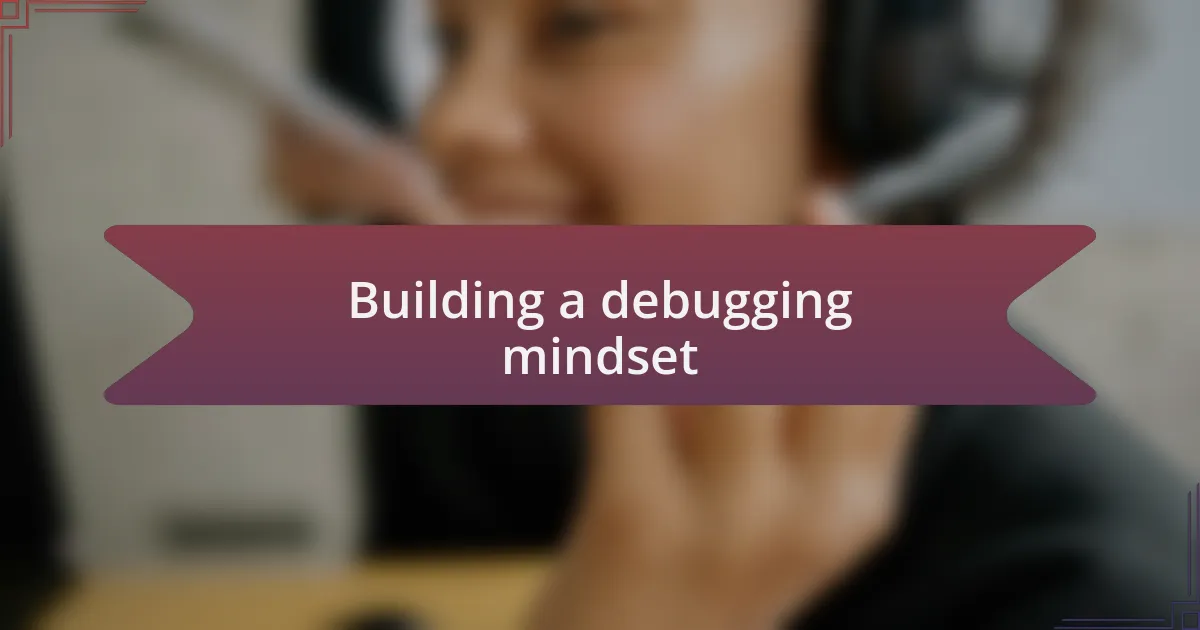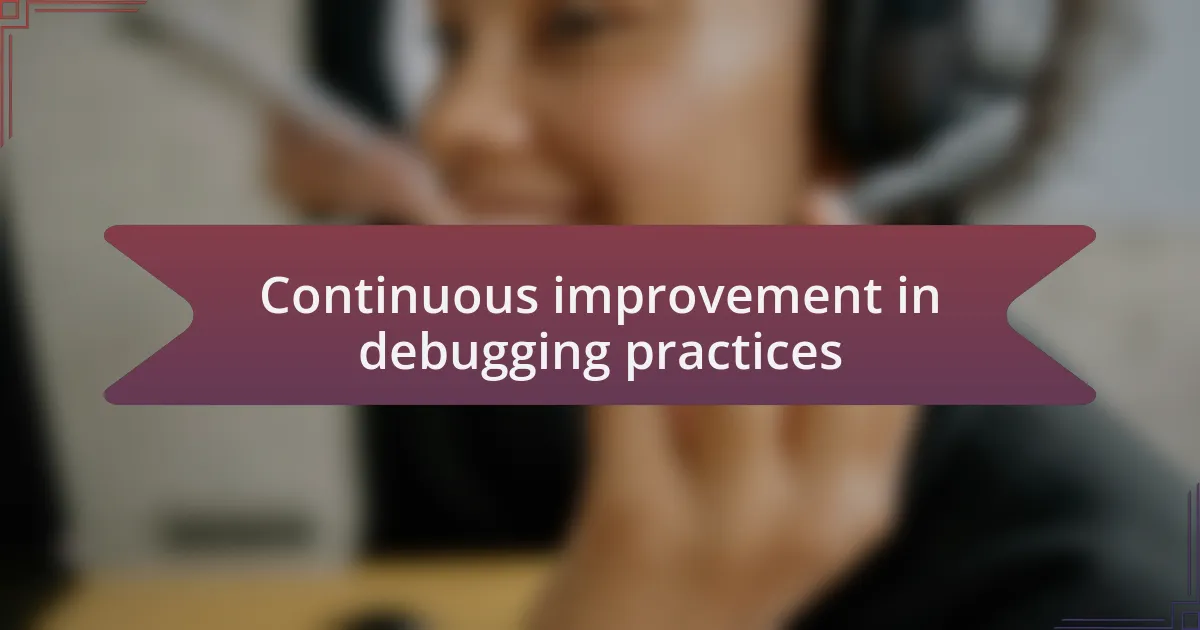Key takeaways:
- Debugging is a vital skill in software development, fostering problem-solving abilities and encouraging continuous learning from mistakes.
- Effective debugging improves the quality of software and enhances communication within development teams, promoting a culture of knowledge sharing.
- Common debugging techniques include using print statements, debuggers, and version control systems to systematically identify and resolve issues.
- Maintaining a debugging journal and practicing collaboration, such as peer code reviews, can significantly enhance debugging skills and promote continuous improvement.

Understanding debugging in software development
Debugging is an essential process in software development, acting like a detective unraveling a complex mystery. I remember the first time I faced a stubborn bug in a project that nearly brought me to tears. It was a frustrating experience, but it taught me that understanding the underlying logic of my code is key to discovering and fixing those elusive errors.
As I delved deeper into debugging, I realized it’s not just about finding faults; it’s about learning and growing from them. Have you ever found that the most challenging bugs lead to the biggest breakthroughs? I have. Each mistake revealed something new about my codebase and made me a better developer. It’s a humbling experience that encourages constant improvement and curiosity.
In many ways, debugging mirrors real-life problem-solving scenarios. When I encounter a bug, I ask myself, “What did I expect to happen versus what actually happened?” This reflection not only helps pinpoint the issue but also deepens my understanding of the code. Each debug session feels like an exploration, where every fix leads me to a richer comprehension of software development.

Importance of effective debugging skills
Effective debugging skills are crucial for any software developer, as they directly impact the quality of the finished product. I remember a time when I overlooked a simple syntax error that delayed a project deadline. That experience highlighted how even tiny mistakes could have significant repercussions. As developers, we can’t afford to be careless; honing our debugging skills ensures we deliver robust and reliable applications.
Mastering debugging fosters resilience and adaptability in the face of challenges. I often think about how a particularly tricky bug made me re-evaluate my approach to coding entirely. Have you ever found yourself stuck for hours only to later realize a minor oversight? Those moments can be disheartening, but they ultimately strengthen our problem-solving abilities and prove that persistence pays off.
Moreover, effective debugging goes hand in hand with communication within development teams. When I was part of a team where tasks were interdependent, sharing debugging experiences helped others avoid similar pitfalls. Isn’t it fascinating how collaboration can turn an isolating task into a collective learning experience? Effective debugging not only sharpens individual skills but also fosters a culture of knowledge sharing, creating stronger teams and ultimately enhancing project outcomes.

Common debugging techniques and tools
When it comes to debugging, one of the techniques I frequently rely on is the use of print statements. I vividly remember a project where a faulty logic path kept causing my application to crash. By sprinkling print statements throughout my code, I was able to trace the execution flow and pinpoint the error. It’s like following a breadcrumb trail—very satisfying when it leads you to the problem!
Another common tool I find invaluable is the debugger integrated into my IDE. Stepping through code line by line allows me to observe the program’s state in real time. There was an instance when I watched the values of my variables change unexpectedly—it was eye-opening! Have you ever used the debugger to uncover an issue you were completely oblivious to? It’s fascinating how visualizing your code can uncover hidden complexities.
I also advocate for using version control systems, like Git, as a debugging tool. When tackling a tough bug, I can compare changes between versions and identify what might have introduced the issue. I recall reverting to a previous commit because a new feature broke existing functionality. It felt reassuring to have that safety net, reminding me that sometimes the best step forward is to take a step back. Isn’t it comforting to know that debugging can be a systematic process rather than a chaotic chase?

Strategies to enhance debugging skills
One strategy I find particularly effective is the practice of rubber duck debugging. I often explain my code out loud to an inanimate object, like a rubber duck on my desk. It may sound silly, but verbalizing the logic forces me to articulate my thought process clearly, often leading to those “Aha!” moments. Have you ever tried explaining your code? You might be surprised at how many gaps in understanding are revealed once you start to talk it through.
Peer code reviews can also elevate your debugging game significantly. When I collaborate with colleagues to review each other’s work, I often gain new perspectives and insights. It’s remarkable how a fresh pair of eyes can uncover issues I completely overlooked. Didn’t you notice how collaboration can sometimes reveal the most obvious solutions hiding in plain sight?
Finally, I encourage keeping a bug tracker, like Jira or Trello, to document debugging experiences. Whenever I resolve a bug, I take a moment to write down the steps I took and the insights I gained. This practice not only reinforces my learning but also creates a valuable knowledge base for future reference. Have you ever considered how a personal log might turn past frustrations into future victories in your debugging journey?

Learning from debugging experiences
Learning from my own debugging experiences has taught me invaluable lessons over time. I recall a particularly challenging bug related to a conditional statement that had me stumped for hours. It was only when I took a break and revisited the problem with fresh eyes that I realized the condition was missing an essential case. That experience reinforced the importance of stepping back and approaching a problem from different angles. Have you ever found a solution just by giving your mind a little space?
Another profound realization came after I embraced the habit of documenting my debugging experiences. Early on, I faced a recurring issue with a memory leak in my application, which felt like chasing shadows. After meticulously tracking the symptoms and solutions, I discovered a pattern that led me to prevent similar leaks in future projects. Doesn’t it make you think about how past experiences can illuminate your path moving forward?
Lastly, I’ve learned to embrace failure during the debugging process. I once spent days fixing an error only to discover it was a simple typo. Instead of feeling defeated, I chose to view it as a learning opportunity. Reflecting on these moments has driven home the idea that mistakes are not just obstacles—they are stepping stones toward greater proficiency. Can you relate to the idea that sometimes the smallest errors teach us the biggest lessons?

Building a debugging mindset
Building a debugging mindset starts with curiosity. I remember grappling with a particularly perplexing issue in a web application where the layout seemed to break only under specific conditions. Instead of rushing to fix it, I allowed my curiosity to lead the way. I viewed each odd behavior as a clue, prompting me to ask, “What if this is not what it seems?” This shift in perspective helped me realize that every problem is an opportunity to dig deeper and understand the underlying mechanics.
I also believe that fostering resilience is key to developing a debugging mindset. There was a time when I faced a stubborn integration issue that wouldn’t resolve no matter what I tried. Frustration bubbled up, and I contemplated giving up. But in that moment of struggle, I reminded myself that every great developer has been here before. I took a breath, adjusted my approach, and eventually uncovered the solution by systematically testing each component. How often do we underestimate the power of patience when dissecting complex problems?
Lastly, collaboration plays a crucial role in building that mindset. While working on a team project, I remember tackling a bug that had all of us stumped. By sharing our perspectives and experiences, we collectively pieced together the puzzle. This collaboration not only led us to a resolution but also reinforced the idea that debugging isn’t just an individual task—it’s a shared journey toward discovery. Don’t you find that some of the best insights emerge from discussing challenges with others?

Continuous improvement in debugging practices
Continuous improvement in debugging practices is essential as we navigate the ever-evolving landscape of software development. I remember a time when I committed to refining my debugging techniques through regular reflections on my past experiences. By analyzing what worked and what didn’t in previous troubleshooting sessions, I discovered patterns in my approach, leading to more efficient problem-solving skills.
One practice that significantly contributed to my growth was maintaining a debugging journal. In it, I documented each bug, the steps I took to resolve it, and the ultimate outcome. This practice not only served as a reference guide but also allowed me to track my progress over time. Have you ever considered how documenting your journey can provide clarity and focus? I’ve found that revisiting these entries fosters a deeper understanding of recurring issues, making me quicker and more effective in future debugging sessions.
Moreover, I believe in the power of continual learning through online resources and communities. When I faced a challenging bug that seemed insurmountable, I turned to forums and tutorials, discovering novel techniques and tools that reshaped my approach. Connecting with other developers who had faced similar issues opened my mind to diverse strategies. Isn’t it fascinating how sharing experiences can accelerate our learning curve? I’ve learned that embracing continuous improvement not only enhances our technical skills but also nurtures a collaborative spirit among developers.